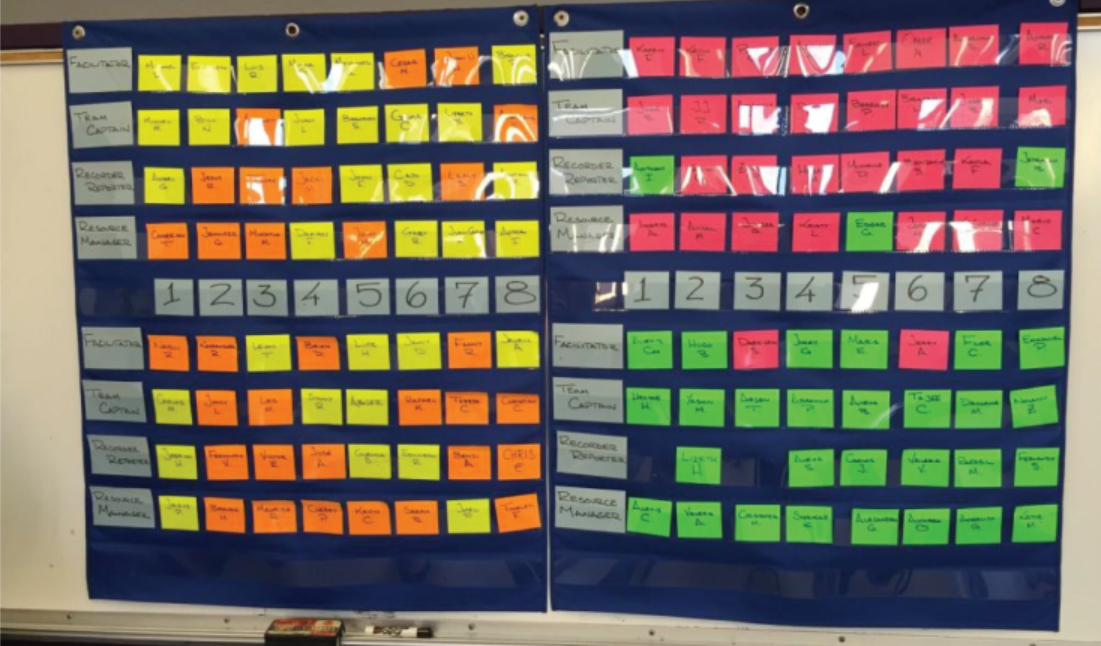Complex instruction
See also: mathematical-mindsets, teaching
Resources:
- Complex Instruction @ SFU school district
- Program for Complex Instruction - 1990s looking site from Stanford
Program of pedagogical strategies based on sociological research by Cohen and colleagues. Aiming to increase participation and learning for all.
Cited by Boaler (see mathematical-mindsets) which may well be an outgrowth/influenced by Complex Instruction.
Principles#
- Multiple ability curriculum - open-ended, rich tasks to support learning of key concept and skills.
- Instructional strategies - norms, roles and teacher interventions to develop autonomy and interdependence
-
Status and accountability - raise expectations, hold individuals and groups accountable for learning, intervening in status issues Linked to "expectation states theory" - status characteristics affect interaction and influence group situations. Rate of interaction in a group is a predictor of learning. Low status can limit interaction. Addressed through
-
multiple-abilities treatment - make visible to all the different types of "intelligence" required for the task:
-
naming the different abilities required
-
create a mixed set of expectations for each student - they are strong/weak on different skills
-
Assigning competence to low-status students
- Public statement recognising competence of individuals
- positive evaluation
-
Methods#
Random assignment of groups and roles#
Group roles and allocations are done randomly e.g. visibly-random-groups. Every few weeks students change groups and roles. Teacher emphasises different roles during classes and reminding facilitators
Roles#
| Role | Description |
|---|---|
| Facilitator | Ensure all group reads the problem. Keep group together. Ensure all are heard. Prompt contributions (different ways of seeing, ready to move on). Ensure everyone can explain. |
| Recorder/Reporter | Ensure group organises results including showing ideas from all, multiple representations. Also need to be ready to join the teacher for a huddle. |
| Resource Manager | Get materials for the team. Make sure all questions are team questions. Call the teacher when done (and perhaps for questions). |
| Team Captain | Remind the team to find reasons for each mathematical statement, search for connections. Not talking outside group |
| Role | Description |
|---|---|
| Organiser | Keep the group together and focused on the problem, no talking outside the group |
| Resourcer | Only person that can get resources, make sure everyone is ready before you call the teacher |
| Understander | Make sure all ideas are explained for understanding for all in group; encourage idea generators to explain if any don't; write down important parts of explanations |
| Includer | Make sure everyone's ideas are listened to; invite other people to make suggestions |
Group Tasks for Complex Instruction#
Summarised from (Cohen et al, 1999)
- foster conceptual understanding group activities are organised around a central concept/big idea
- students encounter the concept in different contexts, multiple opportunities
- tasks are inherently uncertain and open-ended in terms of solution and process
- tasks require multiple different types of abilities to allow students' diverse capabilities to shine
References#
Boaler, J. (2015). Creating Mathematical Mindsets: The Importance of Flexibility with Numbers. In Mathematical Mindsets: Unleashing Students' Potential Through Creative Math, Inspiring Messages and Innovative Teaching (pp. 33--56). John Wiley & Sons, Incorporated.
Cohen, E. G., Lotan, R. A., Scarloss, B. A., & Arellano, A. R. (1999). Complex Instruction: Equity in Cooperative Learning Classrooms. Theory Into Practice, 38(2), 80–86.
